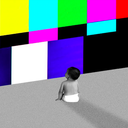We are in the age of the digital babysitter

Published Date: 4/17/2019
Source: axios.com
Parents are relying more than ever on digital babysitters and device-led playtime to entertain their children — and the wide range of content is making it increasingly difficult to monitor what their kids are seeing.Why it matters: This goes beyond the old challenges of kids watching too much TV. Modern parents struggle to keep up with the immense variety of kids programming across a multitude of apps. Plus, controlling what kids are exposed to on platforms like YouTube can feel like an unwinnable battle with algorithms.While the impact of technology on kids is still relatively unknown due to a lack of long-term research, researchers attribute more screen time to increased demands on parents and the convenience of always-on smartphones and tablets.The big picture: Every generation is drawn to the latest type of media, from gathering around the radio to spending hours in front of the TV. Today's technology — the gestural nature of touch screens, for example — is more intuitive for the preschool set and is used for educational purposes, too. That makes it even harder for parents to figure out where to draw the line on screen time, especially when parents often find themselves glued to their own screens to keep up with busy lives.Not all screen time is created equal, as experts have pointed out that some educational programming, interactive features and personalized content can be beneficial for kids.But mediating what children are exposed to across platforms is getting more challenging with the ever-increasing amount of kid-targeted content and algorithms pushing out the next piece of content that can feel out of parents' control, said Shelley Pasnik, director of the nonprofit Center for Children and Technology."The curatorial lift for parents is not insignificant, it requires thought and time to make those selections," she said. "That can feel daunting, along with the fear of missing out and the fear of choosing well for their kids. There's no shortage of opportunities for parents to feel bad."Adding to those fears are reports about the dangers of exposing children to user-generated videos online.A new Wall Street Journal report finds that many of the most popular YouTube playtime videos are often made by unidentifiable sources, and some of them with seemingly Russian ties.Apps like YouTube Kids and Facebook's Messenger Kids have increased parental controls and content monitoring. But parents still worry about unexpected and questionable content popping up without their knowledge.Streaming TV plays a role in this too. A recent Reuters piece describes the onslaught of streaming services targeted toward kids as part of the problem. "Children are the original binge-watchers, with an endless appetite for repeats," it notes.The catch: Parents may not feel like they have better options to safely entertain children at home or on the go. This is particularly true of parents trying to juggle work and child care, or those balancing multiple jobs.A study published in the Journal of the American Medical Association this year found that an increase in screen time for kids might not be the result of new technologies, but rather caused by changes in parental interactions because of work schedules or other socio-economic factors.The study notes that the 2014 high screen-user group was dominated by boys and children with low parental education levels and family income.Baby boomers and Gen Xers often reminisce about the days of meeting up with friends at the neighborhood cul-de-sac or mall. But today, many parents are less comfortable sending their children outside to play unattended.A recent UK study found children spend half the time playing outside than their parents did when they were kids.The economic realities of most dual-career households reduces the availability of adult supervision for activities outside the home.The reality is that phones, tablets, computers and TVs have become some of the easiest ways to keep kids settled and out of trouble.The bottom line: While screen time is unavoidable for most modern families, how parents involve themselves in the experience can change the equation for kids, Pasnik said."Parents talk to their babysitters, kids talk to their babysitters," she said. "Even with digital tools, we can say to our kids, 'Hey, what was that like?' That conversation can continue — just as we continue the conversation with the people who care for our kids."Go deeper: "60 Minutes" talked to scientists studying the effects of screen time on different age groups of children.